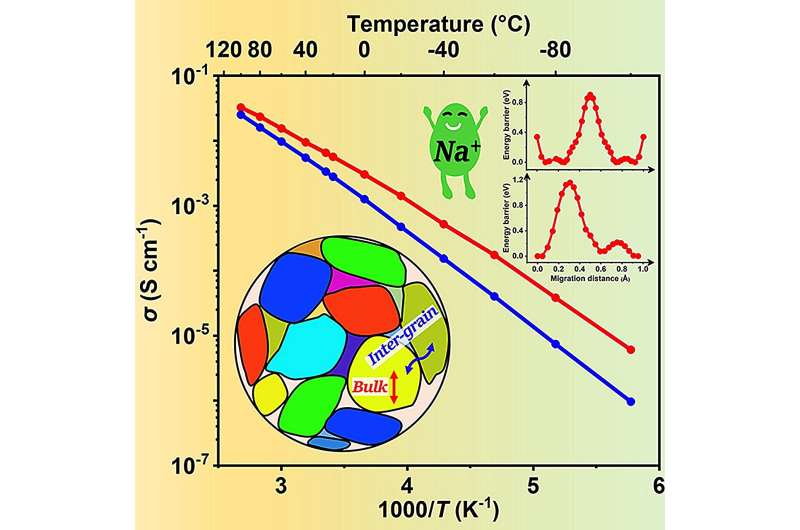
In an advance for energy-storage technologies, researchers have developed high ionic-conductivity solid-state electrolytes for sodium-ion batteries that dramatically enhance performance at room temperature. This development not only paves the way for more efficient and affordable energy storage solutions but also strengthens the viability of sodium-ion batteries as a sustainable alternative to traditional lithium-ion systems.
The rising demand for renewable energy underscores the need for effective and affordable energy-storage solutions. Solid-state sodium batteries (SSSBs) offer notable cost and safety advantages, especially for large-scale grid applications.
However, their widespread adoption is hindered by challenges in achieving high ionic conductivity in solid-state electrolytes, a crucial factor for efficient energy transfer and storage, and a key focus in advanced battery technology research.
A recent study, published in the journal eScience, introduces a novel solid-state electrolyte, Na4.92Y0.92Zr0.08Si4O12 (NYZS), demonstrating exceptional ionic conductivity and electrochemical stability at room temperature.
This new material notably enhances the efficient conduction of ions at room temperature, which is crucial for practical energy-storage applications. The research team achieved this breakthrough by substituting a small proportion of yttrium (Y) with zirconium (Zr) in the crystal structure of the existing material, leading to an optimized arrangement that facilitates easier movement of sodium ions.
This method resulted in an extraordinary increase in ionic conductivity, reaching up to 6.5 mS cm-1 for bulk conductivity and 3.3 mS cm-1 for total conductivity at room temperature. These values represent one of the highest recorded for sodium superionic conductors to date.
NYZS not only exhibits high ionic conductivity but also demonstrates remarkable electrochemical stability, withstanding voltages over 10 volts versus Na+/Na, thus ensuring safer battery operations under diverse conditions.
Dr. Sylvio Indris, a senior researcher at Karlsruhe Institute of Technology (KIT) and a corresponding author of the study, stated, "The NYZS solid electrolyte represents a transformative step in the development of sodium-based energy-storage technologies. It not only supports superior conductivity and stability but is also compatible with scalable manufacturing processes, making it a highly promising material for future energy-storage solutions."
This study represents an advance in the development of sodium-ion batteries for stationary energy storage. It can lead to more stable and efficient sodium-ion batteries, reducing reliance on costly materials such as lithium and cobalt, which are commonly used in current battery technologies.
More information: Aikai Yang et al, Enhanced room-temperature Na+ ionic conductivity in Na4.92Y0.92Zr0.08Si4O12, eScience (2023). DOI: 10.1016/j.esci.2023.100175
Provided by KeAi Communications Co., Ltd.
Citation: New sodium-ion battery tech boosts green energy storage affordability (2024, April 30) retrieved 30 April 2024 from https://techxplore.com/news/2024-04-sodium-ion-battery-tech-boosts.html
This document is subject to copyright. Apart from any fair dealing for the purpose of private study or research, no part may be reproduced without the written permission. The content is provided for information purposes only.
